General
Mak Hosts Association of African Universities Advancement Workshop
Published
9 years agoon

The advancement workshop was held at Africa Suites Hotel, Mutungo from 27th -29th September 2016. The workshop brought together Academic Registrars, Human Resource Managers and directors and Chief Financial Officers from Western, Eastern and Southern Africa Universities that constitute the Association to discuss and dialogue on their roles as Registrars, Financial Officers and Human Resource Officers, articulating their needs in terms of the value adding services they need to provide in the 21st Century University.
In his opening speech, the Secretary General of the AAU extended his apologies for his inability to attend due to other developments at the Secretariat which required his attention and presence. He was however represented by the Vice Chancellor, Makerere University, Prof John Ddumba Ssentamu, who read his speech and also warmly welcomed the participants to the three-day workshop for Executives of African Universities Programme offered by the AAU and Stellenbosch Academy of Advancement.
”In line with our mission, we consider this theme “University Advancement – The Role of the Registrar, CFO and CHR in the 21st Century University” very timely for the topical issues it seeks to address.
Ladies and Gentlemen, all modern organizations today, aspire to sustainable excellence, and universities can surely not be left out of this current trend. Most importantly, those of us in various key positions of leadership have a major role to play in advancing our respective higher education institutions. Registrars, Chief Financial Officers and Chief Human Resource officers certainly form a major segment in piecing together efforts by the various sections of the university towards its transformation.
As leaders of your various institutions, departments and units, you hold the future of your institutions in your hands, providing strategic and critical direction and leadership to the University, and ensuring a coherent vision across all the constituent parts of the University.
It is our hope that through this platform, your needs, will be articulated in terms of the value adding services that should be provided to 21st century Africa HEI’s. I am confident that as we share and discuss through the carefully selected topics and planned session, we can together identify common issues across our universities and come up with their solutions thereof.
Whilst maintaining a good level of optimism about the outcomes of our meeting here, let me also say, that this workshop should not be seen to provide tailor-made solutions to the many challenges within HEIs, but as a collective opportunity to engage in a dialogue, facilitated by the Advancement Academy at Stellenbosch, and other resource persons towards strategic approaches to overcoming some of those common issues identified.
Distinguished guests, you would agree with me, that the classical university model has been challenged by massification, marketization, internationalisation, technology and globalisation among other key emerging issues in the the 21st Century.
All these factors do have a ripple effect on the governance structures of our universites, including the offices of Registrars, CFOs and CHRs in ensuring sustainability and relevance of higher education to society. And most importantly in advancing our institutions. The need to reflect on, and adapt to the changing times can surely not be overemphasised.
Your individual roles in assisting the university pursue its vision, makes you a unique group in the higher education circle whose actions and inactions can affect your institutions in a critical way.
This is why the AAU, has since 2007 been organizing several workshops on Leadership as well as Management Skills Development for senior executives and middle level managers of African Universities respectively. These are aimed at enhancing the leadership skills of university leaders, particularly in the promotion of innovation and management of change, as well as to strengthen collaboration, networking, and capacity building among this group”.
He went on to say that, in 2017, the AAU will be celebrating its Golden Jubilee at the next General Conference that will be hosted in Accra, Ghana and extended an invitation to all participants. 50 years of serving the African continent as its voice for matters on higher education and developmental issues, was indeed a great feat worth celebrating.
He reiterated the commitment and dedication of the AAU and its partners, to continuously engage in effective collaborations with Higher Education stakeholders to implement quality and strategic programmes targeted at improving the quality of education in Ghana and on the African continent as a whole.
I am confident that the various discussions and resolutions which will be reached at this conference will be fervently pursued to the letter.
The Workshop was facilitated by Professor Tobias De Coning of Stellenbosch Advancement Academy. This was done through presentations on different topics such as driving forces that will fundamentally affect the 21st century African universities. The forces singled out were competitive domestic and international student markets, challenges of government funding, competition for new sources of funding, use of digital technologies in campus based learning, blended learning, global student mobility, integration with industry, the scale and depth of industry-based learning, research partnerships and commercialisation, among others. This was followed by discussions on the practical impact of these driving forces. There was also a presentation on what Vice Chancellors and University presidents expect from their senior managers and how these managers meet those expectations through discussions of the challenges they face. Some of the challenges mentioned were, how to attract and sustain sufficient resources, how to attract the best staff and students, how to become the preferred recipient for external support, service delivery that satisfies their clients (staff, students and other stakeholders). There was also sharing of views on what should be done to ensure optimal functionality of Registrar’s, Financial Officers and Human Resource Officers from different perspectives of the various universities present.
Universities represented were University of Cape Coast, Ghana; Stellenbosch University, South Africa; Ezekiel Guti University, Zimbabwe; Eduardo Mondlane University, Mozambique; Kyambogo University; Bugema University; Busitema University; Islamic University in Uganda; Muni University; Uganda Martyrs University, Nkozi and Ndejje University.
In his closing remarks, The Vice Chancellor, Makerere University, Professor John Ddumba Ssentamu said, “I am certain that this workshop has expanded your thinking of the different roles of technical staff in a University and especially the African University within the dynamic global higher education setting. It is no doubt that the roles of the Registrar, Chief Financial Officer and Chief Human Resource Officer are the backbone of the University and the thrusts upon which a successful Vice Chancellor operates”. You know the work you do in your institutions and its level of importance. It is crucial that your services are performed with diligence, precision and above all excellence if African Universities are to reach global competitive standards.
This workshop has equipped you with the required mindsets and strategic tools to help you rethink, redesign and realign your various functions to be able to function effectively serve the Vision and Mission of the University.
As member of the Governing Council of the Association of African Universities, the Association of African Universities and its partners are committed and dedicated to continuously engage in effective collaborations with Higher Education Stakeholders to implement quality and strategic programmes targeted at improving the quality of higher education on the African continent.
He thanked Prof. Tobie De Coning for successfully facilitating the workshop and thanked all the participants for engaging in this important conversation that will help us improve our universities. In a special way, he thanked the participants from Zimbabwe, South Africa, Ghana and Mozambique for attending the workshop.
Lastly, he extended his sincere thanks to the Association of African Universities Secretariat, particularly the Secretary General for supporting the workshop and Ms Yvette Quashie (from AAU) and Ms Martha Muwanguzi on behalf of Makerere University for organizing the workshop successfully.
He awarded certificates to the participants and officially closed the workshop.
Article by:
Martha Muwanguzi
Head International Office
You may like
General
Mak Selected to Host Alliance for African Partnership Africa Office
Published
12 hours agoon
February 23, 2026
Makerere University has been selected to host the Africa Office of the Alliance for African Partnership (AAP). The significant milestone that underscores Makerere’s role in fostering research, innovation, and global collaborations across the continent was announced at a meeting of the University’s Central Management with an AAP delegation on 23rd February 2026.
Makerere’s selection was based on the University’s robust commitment, alignment with the AAP’s Strategic Plan, and proven ability to manage consortium activities. The AAP, which was initiated by Michigan State University (MSU) in collaboration with Ten African Universities and agricultural policy research networks in 2016, targets critical challenges in education, youth empowerment, health and nutrition, agri-food systems, science and technology, water, energy, environment, and culture and society.
Addressing the delegation consisting of AAP Co-Directors from MSU, Dr. Jose Jackson-Malete and Dr. Amy Jamison, accompanied by newly-appointed Director of the AAP Africa Office, Dr. Racheal Ddungu Mugabi and Ms. Clare Cheromoi, the Vice Chancellor, Prof. Barnabas Nawangwe who appreciated the choice of Makerere to host the Africa Office said:
“One of the greatest challenges facing African universities is PhD training, particularly supervisory capacity. Through partnerships such as the Alliance for African Partnership we can leverage international expertise to strengthen supervision—whether through training supervisors or through joint supervision arrangements.”
Prof. Nawangwe equally applauded joint initiatives such as the Grant Writing and Publication project, which gave rise to the establishment of a Writing Centre that he said can be used to build capacity in AAP member universities with Makerere as the hub. Officially launched on 21st March 2023, the project is living up to its expectation of becoming a springboard for strong postdoctoral collaborative research for both institutions and other US universities.
Dr. Titus Awokuse, Vice Provost and Dean for International Studies and Programs at Michigan State University (MSU) who attended virtually, reiterated that Makerere’s selection reflects its long-standing commitment to advancing African higher education, research excellence, and meaningful global collaboration.
Reflecting on the origins of the Alliance for African Partnerships (AAP), Dr. Awokuse explained that nearly a decade ago, MSU initiated a transformative conversation in Atlanta centered on the question: How should we partner differently? From this dialogue emerged AAP—an Africa-centered consortium that now brings together 12 institutions across Africa and the United States.

He emphasized that AAP is grounded in equity, mutual benefit, shared leadership, and deep respect for African priorities and expertise. Since its founding, MSU has served as convener and key supporter, working with member institutions to strengthen research collaboration, promote faculty and student engagement, and address shared development priorities.
Dr. Awokuse underscored that AAP’s success is the result of collective vision and commitment, not the efforts of a single institution. He paid tribute to Lilongwe University of Agriculture and Natural Resources for hosting the Africa Office in its early years and acknowledged the foundational leadership of the inaugural Africa Office Director.
He described the launch of the Africa Office at Makerere University as a significant milestone that reinforces Africa-led leadership, strengthens regional collaboration, and enhances responsiveness to emerging opportunities. MSU, he affirmed, remains fully committed to AAP and to working closely with Makerere and all consortium partners to expand collaborative research, nurture the next generation of scholars, and advance Africa-led solutions to global challenges.
The newly-appointed AAP Africa Office Director, Dr. Racheal Ddungu Mugabi is a member of faculty in the Department of Development Studies, Institute of Gender and Development Studies. Her work on intersectional inequalities in Uganda and other Global South regions uniquely positions her to drive collaborative research and partnerships at the Africa Office.
Initially founded by ten African Universities and MSU, AAP now comprises eleven African members including; the African Network of Agricultural Policy Institutes (ANAPRI)-Zambia, Egerton University-Kenya, Lilongwe University of Agriculture and Natural Resources (LUANAR)-Malawi, Makerere University-Uganda, United States International University-Africa-Kenya, Universite Cheikh Anta Diop-Senegal, Universite Yambo Ouologuem de Bamako-Mali, University of Botswana-Botswana, University of Dar es Salaam-Tanzania, University of Nigeria, Nsukka-Nigeria, and the latest, University of Pretoria-South Africa.
These Universites collaborate under Focal Points to advance policy-relevant research and sustainable development. Makerere University’s Focal Point is Prof. Robert Wamala, Director of Research, Innovations and Partnerships (DRIP).
Addressing the University Management, Dr. Jackson-Malete outlined the African Futures Research Leadership Program, which nurtures early career scholars through mentorship and skill-building as one of AAP’s flagship programs. She noted that the Program that prioritizes female participants or men committed to promoting women in higher education has for the first time during its fifth cohort admitted the first male, Dr. Alfadaniels Mabingo from the Department of Performing Arts and Film, Makerere University.
The AAP Africa Office at Makerere will coordinate activities, boost research collaboration, mobilize resources, and enhance global engagements for socio-economic transformation. This aligns with Makerere‘s broader goals of leveraging international expertise to build resilient institutions.
View more photos from the event: https://flic.kr/s/aHBqjCLjoA
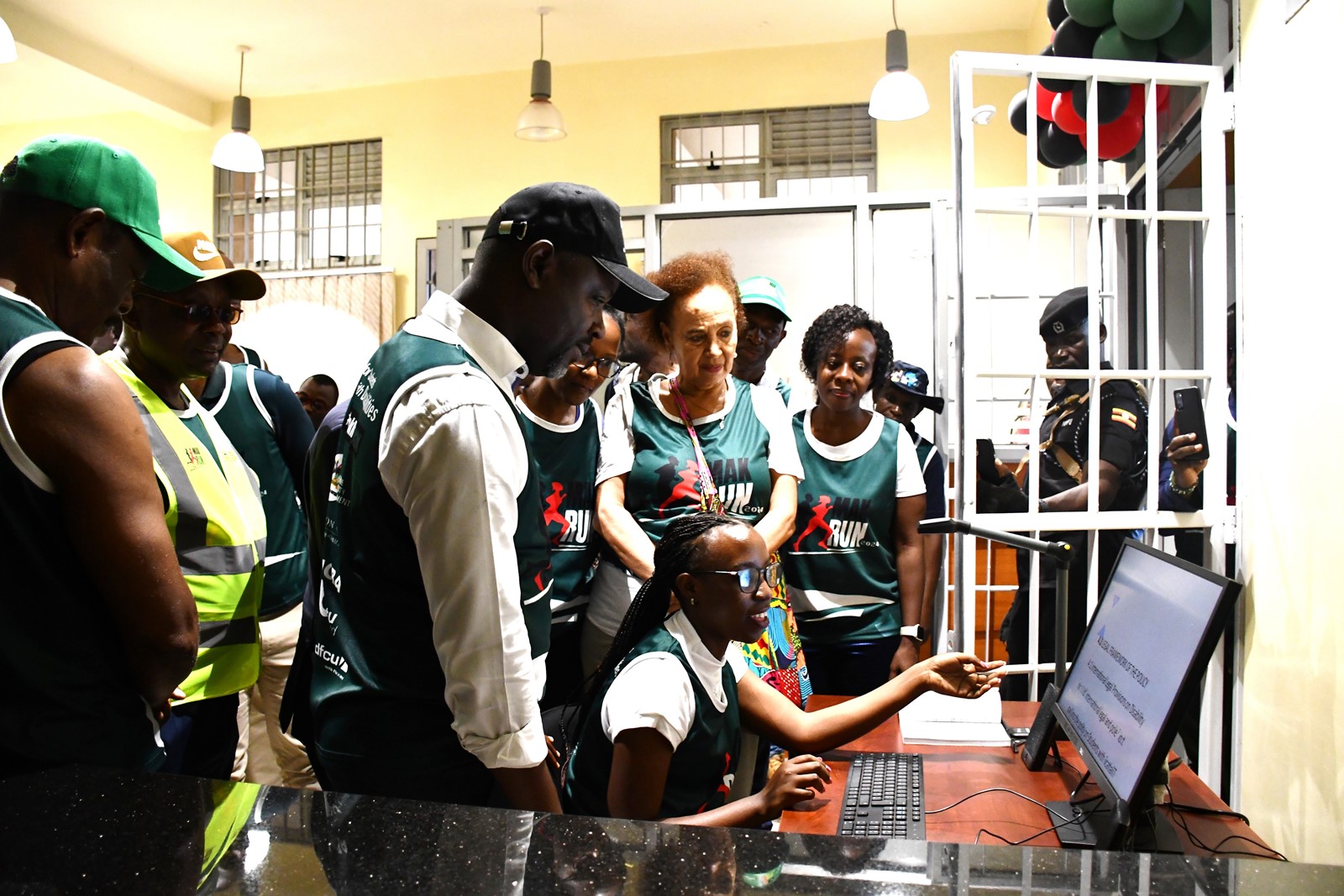
Students with disabilities at Makerere University have been requested to stop seeking for special attention and instead look for solutions and opportunities for personal growth.
This was during a mental wellness, inclusion and safeguarding session organized by the Dean of Students office and the Mastercard Foundation Scholars Program at Makerere University.
Addressing students on mental health and disability inclusion, Mr. Marvin Ggaliwango, a lecturer at the College of Computing and Information Sciences (CoCIS), noted that if the students stop complaining, they will become empowered to take charge of their own development, build resilience and engage confidently in both academic and social environments.
“Turn your lived experiences into tools for innovation. Stop complaining and start creating solutions for yourselves. You are the one living this life, and that gives you the authority to be an expert. When you develop a solution, it doesn’t just benefit you, it helps others too, by removing barriers,” Mr. Marvin Ggaliwango, said.
He encouraged students to see themselves not as victims of circumstance, but as active participants and co-creators of the inclusive environment they wish to experience.
“Learn how to communicate effectively and humbly. If you have a problem, express yourself clearly. Do not isolate yourself or feel resentful. You are not defined by disability, you may face disadvantages, but you still have ability,” he encouraged.
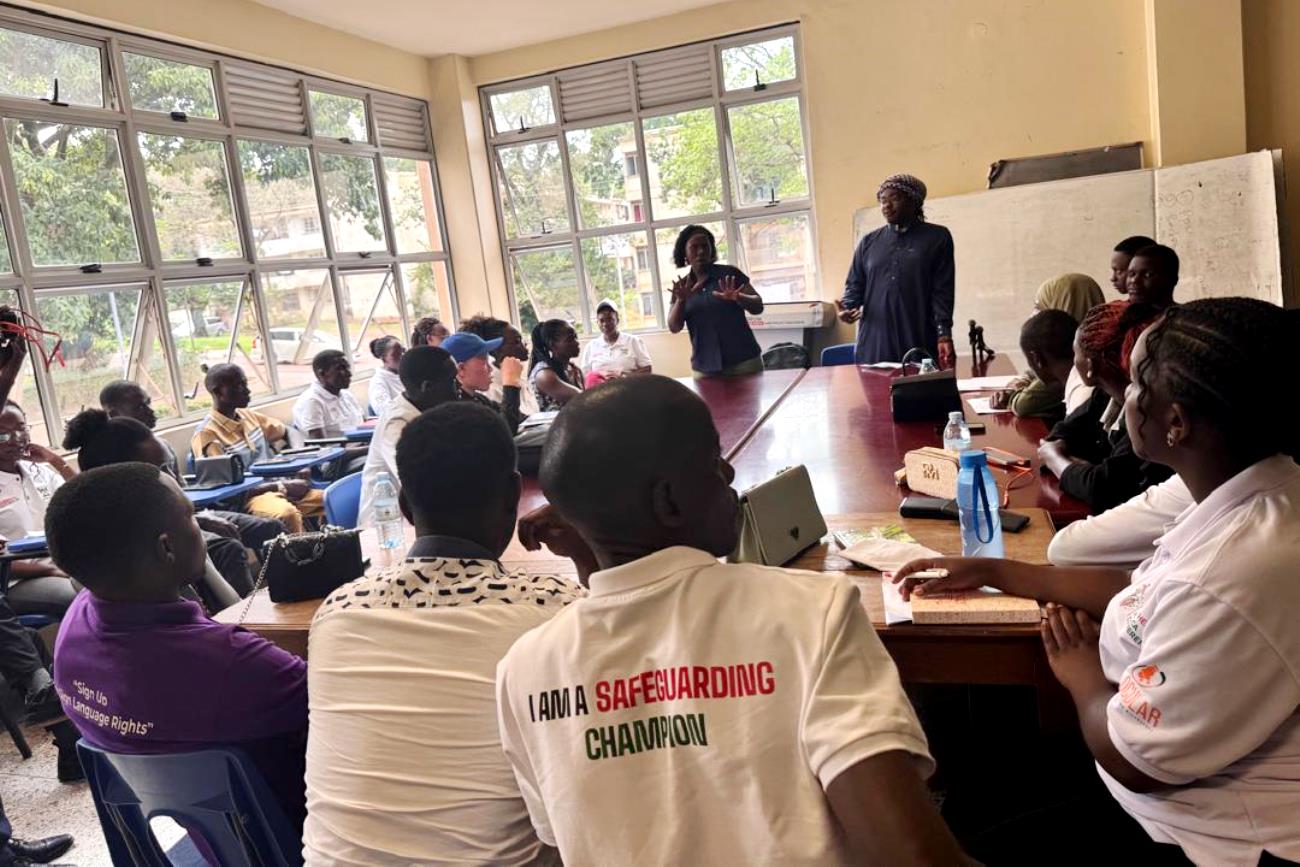
Throughout the session, students listened attentively as he emphasized the importance of self-awareness and personal responsibility, urging them to understand their strengths, acknowledge their limitations and take deliberate steps toward personal growth while contributing positively to the University community.
“We must enhance and ensure that our mental health is number one. Always choose yourself first. Choose what makes you happy and protect your peace. If you are at peace with yourself, your academics will improve. There is a strong link between mental wellness and academic success,” Mr. Ggaliwango, noted.
In his speech, Mr. Musa Mwambu, the Disability Inclusion Advisor at Light for the World Uganda, called upon the students with disabilities to enhance and ensure that their mental health is prioritized.
“As students living with disabilities, sometimes you over expect, because you have a disability you should be given, listened to and when people do not listen to you, you attribute it to your disability, get it from me, even those without disabilities are not listened too. Things are not happening to you because of your disability it is because of the world we live in. Everything that happens to you can happen to others,” Mr Mwambu, noted.
“Have fun with your life. Make yourself happy and be smart. Present yourself in public confidently wherever you go. The way you carry yourself can improve your mental health and how others perceive you,” Mr. Mwambu said.
He reminded the students that gaining admission to Makerere is itself a milestone.
“There are many people without disabilities who have never stepped at Makerere University. Find something that empowers you and hold on to it. You may have a physical impairment, but if you are brilliant in class, you can lead discussions and inspire others,” he added.

During the session, Dr. Rodney Rugyema, the Acting Principal Warden, welcomed the students back from the long holiday. He assured them that the University is committed to their safety and well-being while on campus.
Dr. Rugyema emphasized that the University has systems in place to protect students, both physically and psychologically and encouraged them to report any concerns promptly.
“When you are at the University, you are not on your own, we are always here for you. For us to engage you on mental wellness and inclusion, we want you to be in the right state of mind, whole and complete,” Dr Rugyema, said.
He added: “We are here to empower you and we are calling upon you not be a risk for yourself and always be able to detect risks that are likely to affect your mental health and works towards avoiding them and reporting them to ensure that the University manages them before they escalate into real harm whose impact is more serious than you can think,”
During the session, Ms. Diane Nabikolo Osiru highlighted the University’s broader commitment to safeguarding.
Safeguarding at Makerere University refers to measures put in place to promote safety and wellness of all students, staffs and other stakeholders.
“At Makerere University, safety is not a luxury for few. but it is a right for every student. As the semesters begins, we are urging you to learn how to identify signs of harm or abuses and report them to the appropriate safeguarding contact points,” Ms Nabikolo, said.
For support in case of any harm or abuse, International and Refugee Students, can access support through the Advancement and International Office, while Students with Disabilities, can utilize the Disability Support Center. Those with personal and emotional challenges, can visit the Counselling and Guidance Centre.
In his speech, Dr Joab Agaba, a Lecturer in the College of Computing and Information Sciences, guided students how to report risks and incidences to the MakSafeSpace, the e-reporting platform complimenting the other University traditional reporting channels.
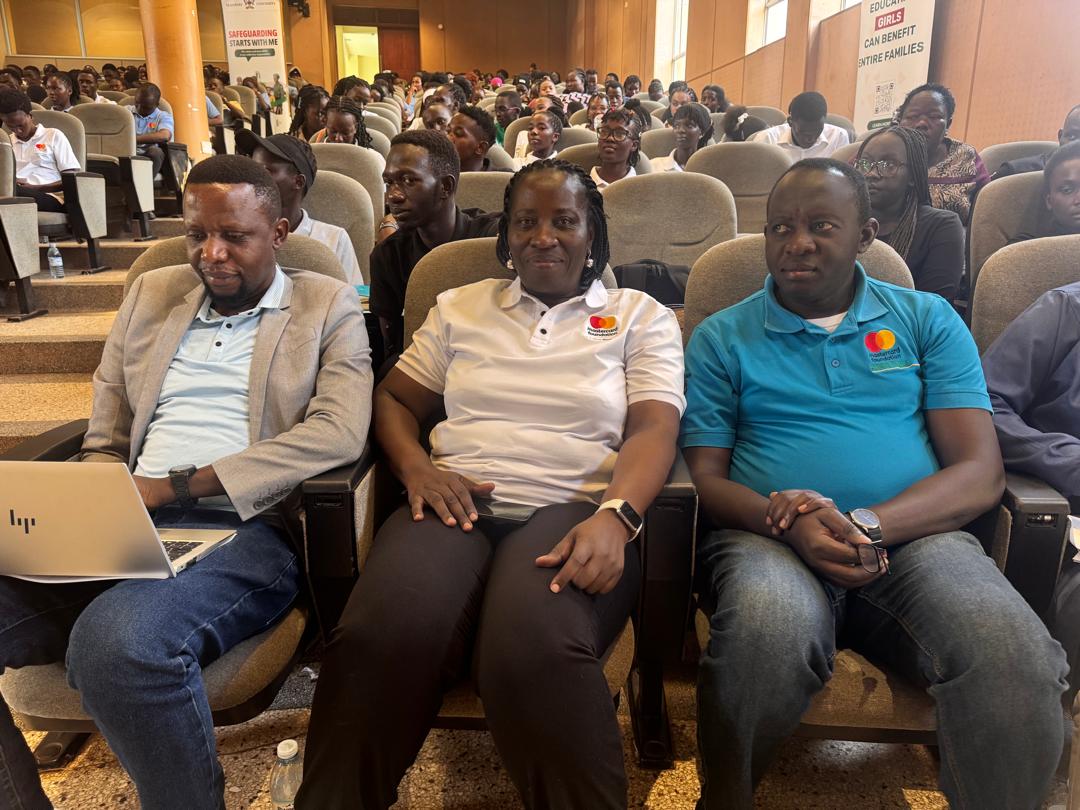
Mr. Henry Nsubuga, the Manager of the Counselling and Guidance Center, shared practical strategies for coping with stress effectively including time management, setting realistic goals, seeking support from peers or counsellors.
Students speak out
Shanitah Nahamya, 2nd year student of the Bachelor of Adult and Community Education
“I have learned how to respectfully and appropriately engage with students with disabilities. In the past, I often felt pity when I encountered them, but now I understand that what they need is not pity, it is respect, support, and equal opportunity.”
Guo Dorothy Geri, 1st year student of the Bachelor of Commerce
“I have learnt how to use inclusive language. Before offering help to a student with a disability, I will first ask them, because not all the time do they need our help. You might think someone wants to be helped to cross the road, yet they are waiting for someone.”
Valentines Doris Aduka, 1st Year student of the Bachelor of Biomedical Science
“I have been calling students with disabilities special names, thinking it was kind. But I have learned that they do not want to be treated differently or labeled in a special way. What they value most is being treated like everyone else, with respect, dignity, and fairness.”
General
Strengthening Global Partnerships to Advance Research, Innovation, and Graduate Training: Makerere University Hosts Delegation from the University of Warwick
Published
5 days agoon
February 19, 2026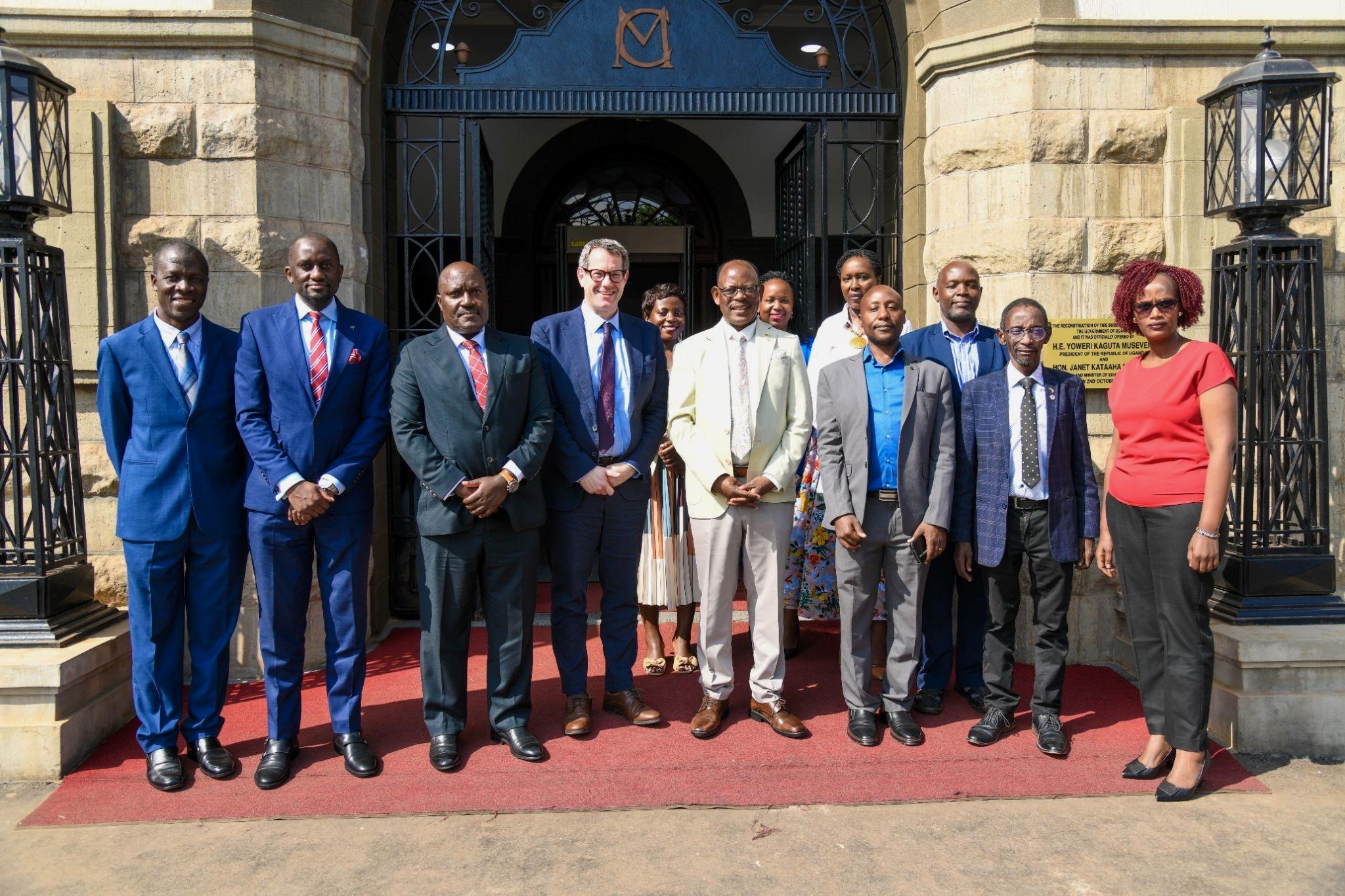
Makerere University continues to deepen its global engagement agenda through strategic partnerships that enhance research, innovation, and graduate training. On Friday, 13th February, 2025, during a recent engagement with a delegation from the University of Warwick (UK), university leaders, researchers, and administrators explored potential collaborations to address pressing development challenges and strengthen institutional capacity.
Expanding Collaboration in Research and Innovation
Welcoming the delegation, Prof. Fred Masagazi-Masaazi, Chairperson of the Makerere University Research and Innovations Fund (Mak-RIF) Grants Management Committee, emphasized the growing dialogue between Makerere University and the University of Warwick. He noted that ongoing discussions are focused on resource mobilization to support research and innovation, as well as building sustainable academic exchanges for both staff and students.
Dr. Roy Mayega, Mak-RIF Coordinator, together with Mrs. Phoebe Lutaaya Kamya, Deputy Coordinator, and members of the Mak-RIF team, highlighted the Fund’s role in catalyzing collaborative research and strengthening partnerships that translate research into societal impact.
Mr. Simon Kizito, Deputy University Secretary, outlined key areas identified for collaboration, including joint research and innovation initiatives, benchmarking visits across disciplines such as law, science, and ICT, and student exchanges designed to strengthen applied research skills. He also pointed to opportunities for training Makerere staff in specialized areas such as tropical diseases and innovation ecosystems, drawing lessons from Warwick’s strong linkages with industry partners located within its campus.
Makerere’s Strategic Priorities and Global Role
In his remarks, the Vice Chancellor underscored the longstanding relationship between Makerere University and the University of Warwick, dating back to the early 1980s, initially through staff training and more recently through collaborative research.
He highlighted Makerere’s historic contribution to leadership development across Africa and beyond, and the University’s continued growth following faculty rebuilding efforts in the 1980s, which have strengthened its research capacity. Today, Makerere has over 1,300 academic staff, more than 1,000 of whom hold PhDs, positioning the institution to play a leading role in knowledge production.
The Vice Chancellor also outlined major thematic areas where partnerships are critical:
- Climate change and food security: Researchers at the College of Agricultural and Environmental Sciences (CAES) are developing drought-resistant and high-yield seed varieties to address changing weather patterns and food insecurity.
- Public health and infectious diseases: Uganda faces frequent outbreaks of diseases such as Ebola and Marburg, and Makerere has built strong capacity in outbreak response and tropical medicine. The University’s medical school and the Infectious Diseases Institute (IDI) continue to play a pivotal role in research and treatment.
- Peace and conflict studies: Through initiatives such as the Rotary Peace Centre, Makerere contributes to training global leaders in conflict resolution.
- Climate-sensitive macroeconomic modelling: Makerere recently hosted a conference in collaboration with the Ministry of Finance, Planning and Economic Development to advocate for climate-responsive macroeconomic modelling and to plan for the establishment of a Centre of Excellence in this field.
- Innovation and technology: The University’s innovation ecosystem has produced notable outputs, including Africa’s first electric vehicle and ongoing work to expand incubation facilities to enable students to graduate with viable enterprises.
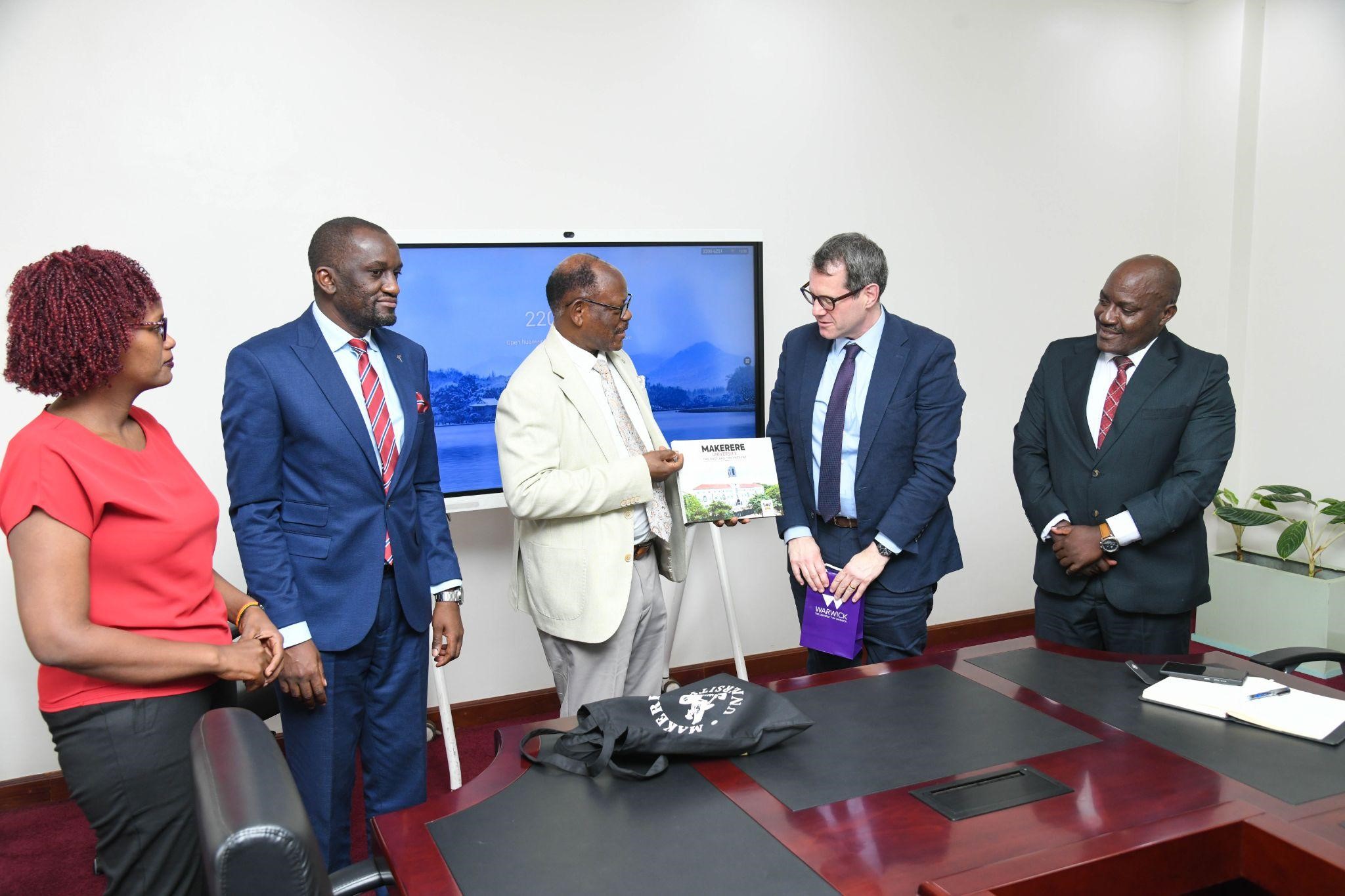
The Vice Chancellor emphasized that addressing youth unemployment remains a central priority, noting that innovation, entrepreneurship, and graduate training are essential to building stable societies.
He further stressed the importance of expanding graduate education. Africa currently produces a small proportion of global research output, and increasing PhD and Master’s training supported by international partnerships remains critical to accelerating knowledge production and development outcomes.
Internationalization and Shared Learning
Speaking on behalf of the University of Warwick, Professor Daniel Branch, Deputy Vice Chancellor, reflected on Warwick’s own institutional journey, noting that its growth has been driven by a strong focus on internationalization, innovation, and research. He expressed Warwick’s commitment to building productive partnerships with African universities, including Makerere, to advance joint research, training, and innovation.
Professor Branch also highlighted the importance of university-industry linkages, citing examples such as collaborations with major manufacturing firms that provide practical training opportunities and inform curriculum development.
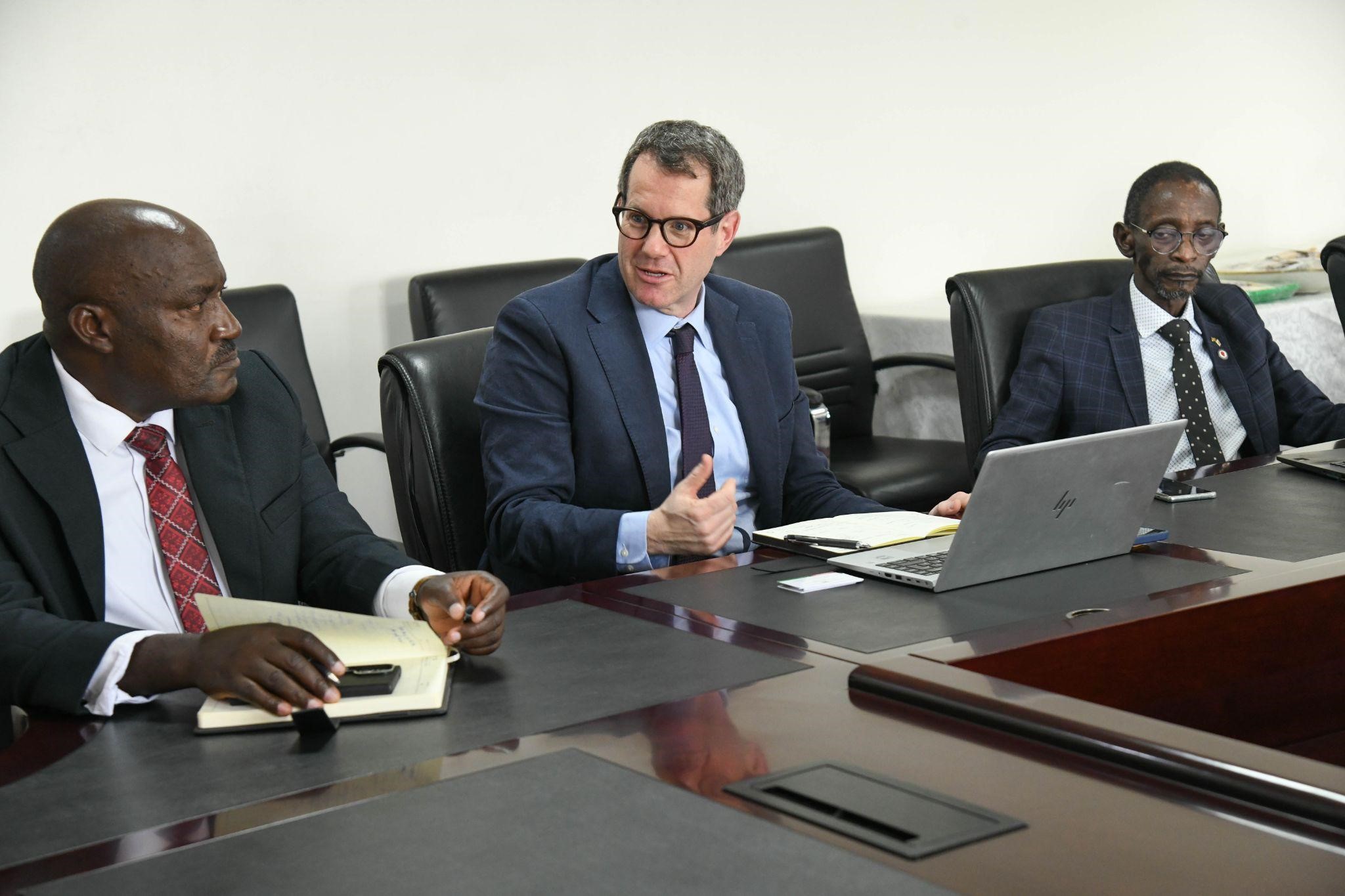
Showcasing Research and Innovation at CEDAT
A second session of the engagement was held at the College of Engineering, Design, Art and Technology (CEDAT), where academic leaders and researchers presented ongoing work across multiple disciplines.
Presentations included:
- Development of a solar water pump through reverse engineering (Dr. Edmund Tumusiime)
- Crane Cloud, a locally developed cloud-computing platform (team from the College of Computing and Information Sciences)
- Profiling gaseous emissions associated with burnt bricks (Dr. Nathan)
- Integration of centralized grid and decentralized renewable off-grid systems: a techno-economic analysis (Dr. Abubaker Waswa)
- Innovation and digitalization pathways for affordable housing in Sub-Saharan Africa (Prof. Stephen Mukiibi)
The session was attended by CEDAT leadership, including the Principal, Prof. Moses Musinguzi, as well as deans and heads of department from engineering, built environment, and industrial and fine arts. The day’s activities were concluded with a tour of Makerere University’s Innovation Hub.
The engagement reaffirmed Makerere University’s commitment to building strong, mutually beneficial partnerships that accelerate research, strengthen graduate training, and drive innovation. As global challenges such as climate change, public health threats, and youth unemployment intensify, collaboration among universities remains essential to developing scalable, evidence-based solutions.
Through partnerships such as the one Makerere University and the University of Warwick hope to activate through a Memorandum of Understanding in the near future, Makerere continues to position itself as a leading research-intensive university dedicated to transforming society through knowledge, innovation, and global cooperation.
Caroline Kainomugisha is the Communications Officer, Advancement Office, Makerere University.
Trending
-

 General2 weeks ago
General2 weeks agoAptitude Exam (Paper 1) Results for the Mature Age Entry Scheme 2026/2027
-

 Health5 days ago
Health5 days agoUganda has until 2030 to end Open Defecation as Ntaro’s PhD Examines Kabale’s Progress
-

 General6 days ago
General6 days agoMastercard Foundation Scholars embrace and honour their rich cultural diversity
-

 General2 weeks ago
General2 weeks agoFor Youth by Youth – Call for Second Cohort Applications
-

 Agriculture & Environment4 days ago
Agriculture & Environment4 days agoUganda Martyrs Namugongo Students Turn Organic Waste into Soap in an Innovative School Project on Sustainable Waste Management
